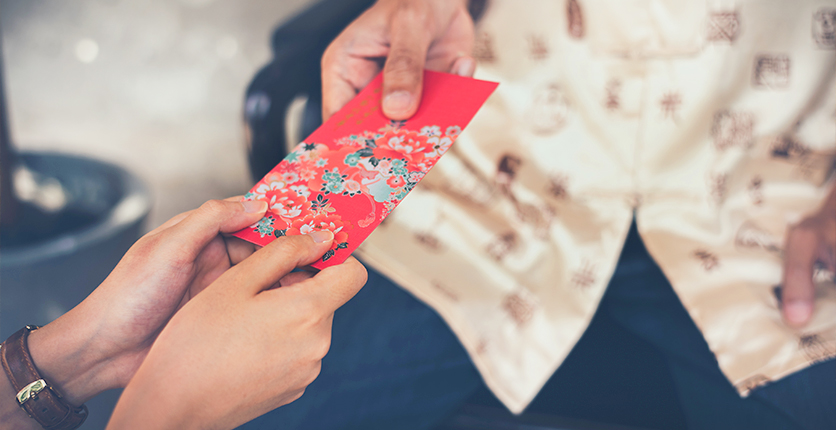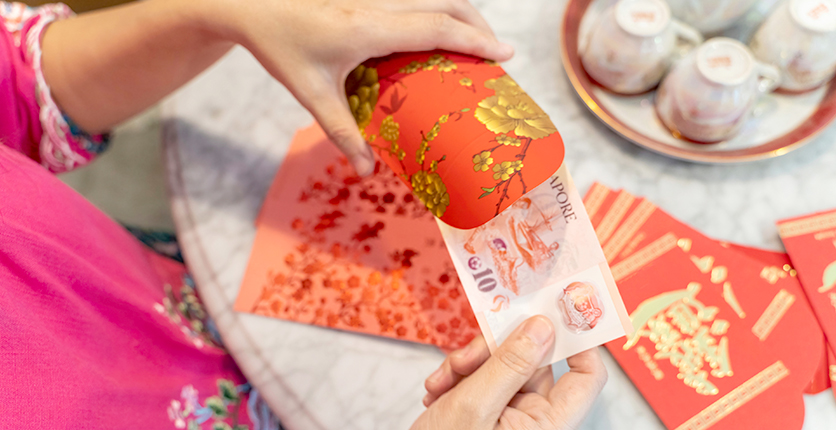The town is painted over in a cheery shade of red, a sure sign that Chinese New Year is just around the corner. From red lanterns to red couplets, the auspicious colour is found in every nook and cranny, but none more significant, perhaps, than the red packets.
Known as ‘hongbao’ in Mandarin, these money-filled envelopes are symbolic blessings given to younger generations by their elders, and often the highlight of children’s CNY celebrations. But how much do you know about this tradition? Here are 8 things you should know about giving and receiving hongbaos.
1. It originated from a demon-fighting tale

The custom of giving hongbao is believed to have come from an ancient Chinese legend about a demon known as Sui, who terrorised children on Lunar New Year’s Eve. According to folklore, the Eight Immortals disguised themselves as coins to help an elderly couple ward off the evil spirit. The couple wrapped the coins in red paper and hid them under their child’s pillow. When Sui crept up to the child at night, it was scared off by the bright lights that emanated from the coins. Parents all around the country then started to adopt this practice and the money became known as ‘ya sui qian’ (压岁钱), which translates as ‘money to suppress Sui’.
2. Numbers matter when it comes to hongbaos

Like many CNY traditions, there are several unspoken rules to the amount to give in hongbaos. One of the most important rules is to avoid giving amounts that include the number ‘4’ because it sounds similar to ‘death’ in Mandarin and some dialects. You should also steer clear of odd numbers as they are traditionally associated with funerals.
3. When in doubt, always go with even numbers
As the Chinese saying goes: all good things come in pairs. If you’re ever unsure of the right figure to include in your hongbao, your best bet would be to give denominations that end with the number ‘8’, which sounds like ‘flourish’ in Mandarin.
To learn more about the amount to gift, read our guide here. And remember to keep a few extra hongbaos on you in case you bump into someone you know during the festive season.
4. Don’t give out old, wrinkled notes

Besides the value of the hongbao, another notable gifting etiquette is to use clean and crisp notes. This custom stems from the long-held tradition to start the New Year fresh with new things, such as new clothes and new shoes. However, the notes don’t have to be newly minted; they just need to look unblemished. This is why banks around Singapore will start to distribute new notes in the weeks leading up to CNY.
5. Learn how to properly receive a hongbao

Traditionally, children would kneel to receive their hongbao from their elders. While this is still practised by some families, most households these days have adopted a more casual approach and would simply exchange auspicious greetings. So, make sure to have a few phrases ready, and always accept the hongbao with both hands to show respect. Doing otherwise is believed to bring bad luck. Lastly, the envelopes should only be opened in private.
6. The tradition has gone digital

Whether it’s to avoid queueing at the bank to withdraw cash, adopt a more sustainable paper-less lifestyle, or to overcome social distancing regulations, electronic hongbaos are becoming increasingly popular. Most banks in Singapore now offer this service and you can even add personalised greetings and graphics to your e-hongbao. If sending money virtually doesn’t feel festive enough, you can opt for a QR hongbao that lets you load money onto a QR card that you can place in the red packet.
7. Hongbaos are not just for CNY

While red packets are most closely associated with Chinese New Year, it is certainly not limited to this festival. In Chinese culture, hongbaos are also given during other celebratory occasions, such as weddings and birthdays, as blessings. These hongbaos are often differentiated by the fortuitous words used on the envelope’s design. For instance, hongbaos for birthdays would bear the Chinese character for ‘longevity’ (寿) while those for weddings would be inscribed with ‘double happiness’ (囍).
8. Hongbao-giving also goes beyond Chinese culture

Other religious and ethnic groups in Singapore have also adopted similar customs. Green envelopes are used by the Muslim community during Hari Raya Aidilfitri, while the Indian community has taken to giving out purple envelopes for Deepavali. Elsewhere, parents in South Korea and Japan use white envelopes instead of red for monetary gifts to children during the New Year.
Want more articles like this, and other lifestyle content right in your inbox? Sign up for the eNSman Newsletter – you don’t need to be a SAFRA member to subscribe – and never miss another story!








